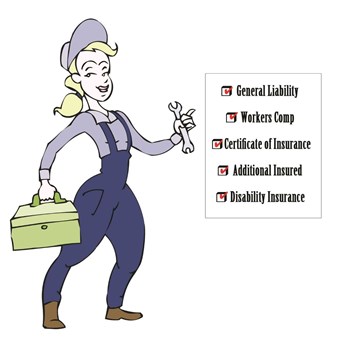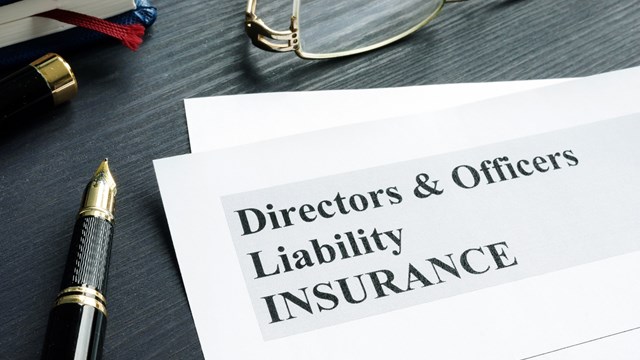
All professional contractors and service providers are required by law to carry insurance to cover their activities. Any condo building should also carry its own insurance to cover accidents or other incidents on the property—this could include anything from slip-and-falls to staff injuries to damage from doing electrical work.
The latter is important to help minimize risk. Lawyers advise that you can’t always control your vendors’ and contractors’ safety habits, and negligence claims can easily end up in court and out of your hands, so it pays to make sure you don’t expose your condo to serious liability and expense.
Are you Covered?
According to Michael Colman, managing partner of JGS Insurance in Holmdel, contractors, along with all other companies (save for sole proprietors), are required to have workers' compensation insurance in the state of New Jersey. However, general liability is not mandatory.
An association must verify a contractor’s insurance coverage prior to allowing them on the premises. An insurance certificate showing proof of general liability, workers compensation, commercial auto insurance and/or umbrella liability should be provided. So what should you see on the certificate?
“They should be current. They should have good limits of liability—at least $1 million per occurence,” Joseph Rice, CIC, of The Rice Agency in Somerville, says.
Checking for a license is also recommended, as an unlicensed contractor is usually uninsured as well. If a condo uses an unlicensed contractor and property damage occurs, the individual may have no way of reimbursing the association for damages caused. Furthermore, if a third party suffers an injury at the property, there may be no insurance coverage.
Sometimes a piece of paper isn’t enough—the language must be correct also. Colman says the certificate of insurance should also state explicitly that the association is included as an additionally insured party on the policy. In essence, what that means is that someone who gets hurt can sue the association and the contractor but when you have that language, it’s clear the contractor will take on that liability.
Checking Credentials
To be on the safe side, Richard Resnick, an agent at Schechner Lifson Corp. in Chester, also urges associations to create a contract with a general contractor to further ensure protection from vicarious liability.
"Anytime a job is subcontracted to others, there should be a formal contract agreement," Resnick says. "The contract should contain an adequate risk transfer mechanism including 1) a hold harmless indemnification agreement and 2) specific insurance requirements. The hold harmless specifies in the event of your negligence--meaning Mr. Subcontractor--should a third party sue us for bodily injury and/or property damage, you will hold us harmless, defend and indemnify for all costs associated with the claim."
Indemnification should take the form of actual insurance, transferring risk to an insurance policy. Insurance requirements should dovetail the hold harmless obligation, specifying coverage, limits and who (additional insureds) are to be insured, he says.
If the process of verifying credentials isn’t thorough, an association can be leaving itself vulnerable to future claims. So, it is essential to check for things such as gaps and lapses in coverage (make sure the coverage extends throughout the entirety of the work project time). But even the most comprehensive of verification processes can’t completely protect a building.
“In the absence of proper coverage on the contractor's side, let's say one of these window washers gets hurt, and if comes out in the wash that the contractor had no workers' compensation, your condo association could be held responsible on its workers' compensation, same as though that contractor was one of [the association's] employees, instead of an independent contractor,” Rice says.
Case in Point
So what happens if a contractor is injured on the job and is not properly covered by their employer? The hiring party, in this case, the association, could assume vicarious responsibility, experts warn.
Joel Davis, a Hoffman Estates, Illinois-based sales and marketing manager for Community Association Underwriters, warns about the repercussions of hiring unlicensed contractors, and the literal price associations might have to pay.
“An association in the north shore suburb of Chicago hired a painting contractor to work on their premises to paint the exterior window frames, but the contractor never provided a certificate of insurance as they said they would. So,” he continues, “they end up working on the premises and a painter falls off the ladder from the third story and breaks his back. He tries to file a claim with his painting company and they say, ‘Sorry, guy. We let our policy lapse. There’s no coverage for us.’ So that injured painter has a $600,000 broken back claim so he then turns around and files a claim against the condominium association. Well, they didn’t have one of these 'if any’ workers' comp policies—this $600,000 had to be paid out of their general liability coverage. That’s bad because that’s a big claim against them on their loss history, and when they go to secure other insurance quotes, they have to show this big claim that they really had nothing to do with other than that they hired a contractor.”
Protecting your Association
To prevent your association from succumbing to a similar unfortunate situation, experts recommend purchasing an ‘if any’ workers’ comp policy. Anyone working on a property is considered a for-hire worker and therefore the remedy for injury is covered by workers’ compensation insurance.
In addition, "the condo association should have a worker's compensation policy since they use subcontractors to make repairs in and around the development," Resnick says. "These policies are not expensive. The premium is based on payroll and can be represented on an "if any" basis; minimum premiums would then apply. Condos have boards/trustees where everyone serves on a voluntary basis, there is no payroll. If a subcontractor (or employee) is working on the premises and sustains an injury the condo's worker's compensation policy would respond should there be a problem with or a lapse in coverage regarding the subcontractor's worker's compensation coverage." Colman says associations’ bylaws usually require them to carry an ‘if any’ policy as a safeguard. Because workers’ compensation costs are determined by payroll, and board members and other participants typically work on a voluntary basis, the premium is relatively affordable. The protection and assurance it provides is priceless, Rice says.
“I have too many condo associations that don't see the need or don't care to cover the need to have workers' compensation,” Rice says. “Even though the cost is very minimal, it fills in a gap of a 'just in case.’ That can be very expensive to not have coverage. To put one of these policies in place for a condo association, they’re typically $1,000 for a year, and that's if they have virtually no pay roll designation for these contractors. It's a statewide cost that would be subject to audit. If it turns out there is some payroll then it could be more. That, to me, is $1,000 well spent,” he says.
In the tough economic environment we currently live in, there are many contractors who make promises of quick and inexpensive repairs, but this shouldn’t stop a board from carefully choosing a contractor to make sure the contractor is properly licensed and insured.
Keith Loria is a freelance writer and a frequent contributor to The New Jersey Cooperator. Editorial Assistant Enjolie Esteve contributed to this article.






Leave a Comment